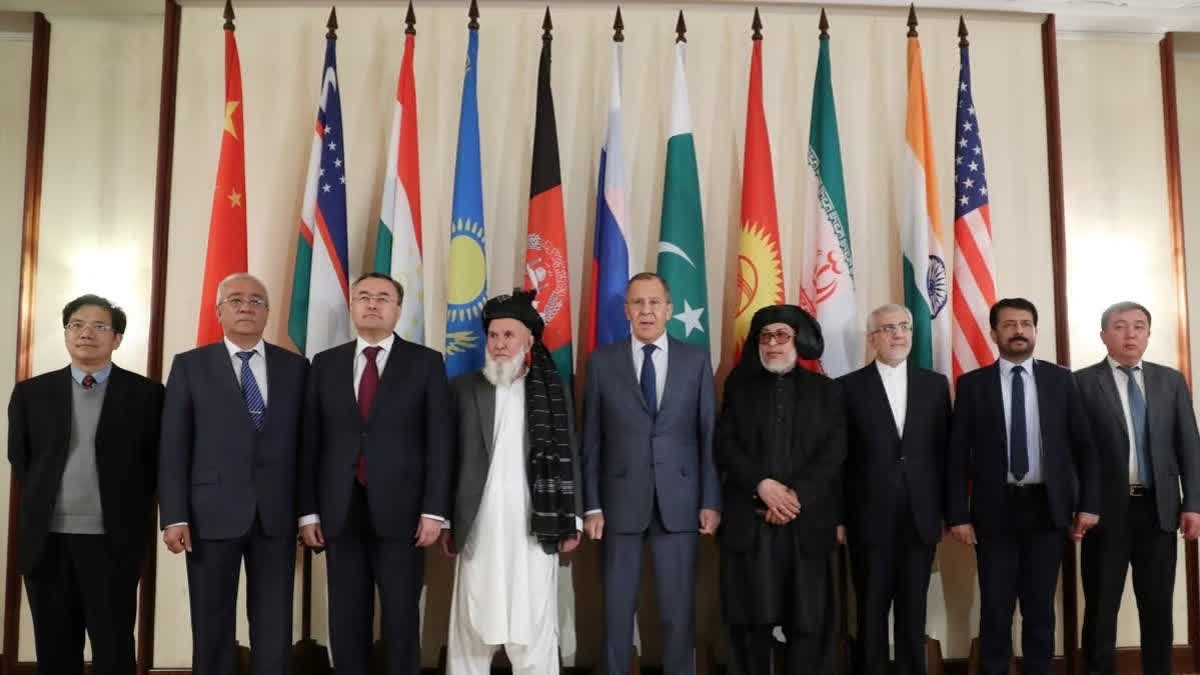New Delhi: Even as China became the first country earlier this month to appoint an ambassador to Afghanistan under the new Taliban regime, speculations are rife about what position India will take in this year’s Moscow Format Meeting to be held in the Russian city of Kazan on September 29.
The annual Moscow Format Meeting was started in 2017 as a regional platform for consultations between special envoys of Russia, Afghanistan, India, Iran, China, and Pakistan to promote peace, and stability and facilitate national reconciliation in war-ravaged Afghanistan. Later, five Central Asian nations – Kazakhstan, Kyrgyzstan, Tajikistan, Turkmenistan and Uzbekistan – joined the consultations.
Reports suggest that the Taliban have reached out to India seeking New Delhi’s support for economic stability and international recognition of the regime in the South Asian nation. Suhail Shaheen, head of the Taliban’s political office, has been cited as saying that his country seeks to have traditional positive ties with India.
Following the Taliban’s return to power in August 2021, the Afghanistan government budget lost 80 percent of its funding and food insecurity became widespread. The Taliban returned Afghanistan to many policies implemented under its previous rule, including banning women from holding almost any job, requiring women to wear head-to-toe coverings such as the burkha, blocking women from traveling without male guardians, and banning all education for girls.
All this time, India has refused to recognize the Taliban’s “Islamic Emirate” and has emphasized the importance of respecting human rights and protecting minority communities. India has maintained a “technical team” in its embassy in Kabul to assist with humanitarian efforts but has not allowed the Taliban to appoint diplomatic staff in the embassy in New Delhi.
The Afghan embassy in New Delhi has been facing financial challenges since the fall of the Ashraf Ghani government. There have been concerns about the whereabouts of the Afghan Ambassador to India Farid Mamundzay, and there appear to be internal issues within the Afghan mission in New Delhi.
The meeting in Kazan on Friday assumes significance given that China has gone ahead to become the first country to appoint an ambassador in Kabul under the current Taliban regime. On September 13, Afghanistan’s acting Prime Minister Mohammad Hasan Akhund and Foreign Minister Amir Khan Muttaqi, welcomed China’s newly appointed Ambassador Zhao Sheng at the presidential palace in Kabul.
Subsequently, the Chinese embassy in Afghanistan urged the international community to continue engaging in dialogue with the Taliban and, also encouraged the Taliban to adopt moderate policies and establish an inclusive government.
The Taliban has also been strengthening diplomatic ties with Russia, Pakistan, and Turkmenistan, but none of these countries has accepted a full-fledged ambassador from Kabul under the current circumstances. Given that China has officially appointed an envoy to Afghanistan, what will India’s stance in the Kazan meeting be?
There has been no official confirmation from the Ministry of External Affairs about India’s participation in the Moscow Format meeting in Kazan till the time of filing of this report.
“See, India does not have any economic or security relationship with the Taliban,” Ayjaz Wani, Fellow in the Strategic Studies Programme of the Observer Research Foundation think tank, told ETV Bharat. “We don’t have a border with Afghanistan, unlike China. They (China) are trying to create a circle of friends in the region.”
Wani explained that China is trying to use the Taliban to secure its China-Pakistan Economic Corridor (CPEC). The CPEC, which passes through Pakistan-occupied Kashmir, is a key project of Chinese President Xi Jinping’s pet Belt and Road Initiative (BRI). From the very beginning, India has opposed this project and the BRI as a whole.
Wani further said that it is the Central Asian countries that are having problems with Afghanistan after the Taliban started constructing a canal to divert the waters of the Amu Darya River. The Qosh Tepa Canal is expected to be 285 km long and the overall initiative seeks to convert 550,000 hectares of desert into farmland. The Taliban government has made the canal a priority project and the construction began in early 2022. Images supplied by Planet Labs demonstrate that from April 2022 to February 2023, more than 100 km of canal was excavated.
“The Taliban is a rogue power,” an expert told ETV Bharat. “China is trying to engage with a rogue power. But the fact of the matter is that there can be no marriage between Communists and Islamists.” This brings us back to the same question: what will India’s position be in the Kazan meeting? Observers say that India has been successful in sending the message through international forums like the Shanghai Cooperation Organisation (SCO) that Afghanistan should have an inclusive government. Many countries have endorsed India’s position.
To know India’s equation with the Taliban regime in Afghanistan, one will have to wait till the conclusion of the Moscow Format Meeting in Kazan.



